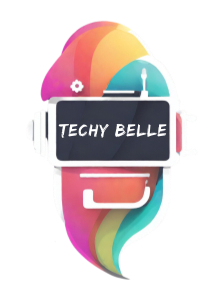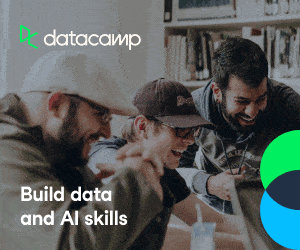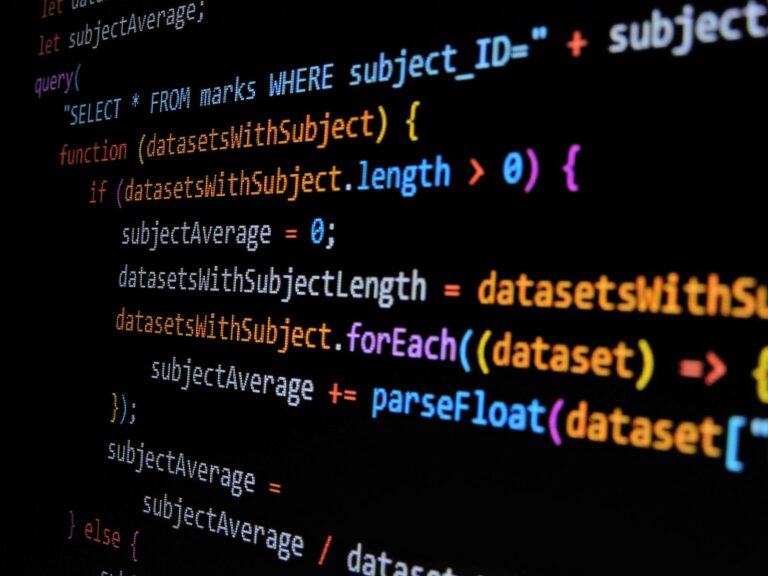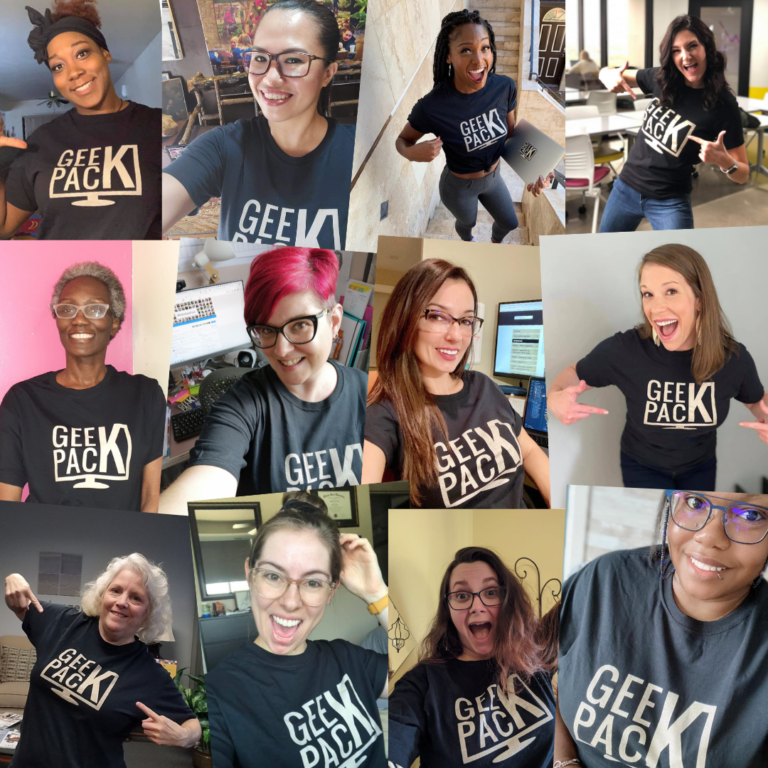10 DataCamp Courses and Features: Empowering Women in Learning Data
Hey there, lovely readers! ? Just a heads-up, some of the links in this post are affiliate links. That means if you click on them and make a purchase, I may earn a small commission at no extra cost to you. Your support helps keep this blog running and allows me to provide you with valuable content. I only recommend products or services that I truly believe in. Thanks for being amazing and supporting my work!” ??
Are you eager to dive into the world of coding and data science? In this blog, I’ll be taking a look at DataCamp Courses. As a fellow learner, I’ve had the opportunity to explore this platform, and I’m excited to share my insights with you.
Impact-Site-Verification: f66afc0c-ea5b-49ae-9583-f1f55e478a2f
TLDR: DataCamp courses are made up of a wide array of courses in data science, data analysis, and coding. These courses cover programming languages like Python and R, data manipulation, visualization, statistics, machine learning, SQL, big data tools, and industry-specific tracks. They are designed for learners of all levels, with hands-on, interactive lessons. DataCamp’s course library is a valuable resource for anyone seeking to enhance their skills in data-related fields.
Table of Contents
What is DataCamp?
DataCamp is an online learning platform that specializes in data science, data analysis, and coding courses. It offers a wide range of interactive courses designed to help individuals, regardless of their prior experience, develop skills in areas such as Python, R, SQL, machine learning, and more. These courses are typically hands-on and consist of video lectures, coding exercises, and challenges to ensure practical knowledge and skills are gained.
DataCamp courses are known for having a user-friendly interface and flexible learning approach, which allows learners to progress at their own pace. The platform is popular among students, professionals, and anyone interested in mastering data-related skills. With a subscription, you gain access to a vast library of courses and resources, making it a valuable tool for those looking to enhance their data science and coding abilities.
Who is DataCamp for?

DataCamp courses are designed for a broad audience, making them suitable for various individuals with different backgrounds and goals.
Here’s who DataCamp is for:
1. Aspiring Data Scientists: DataCamp offers a structured learning path for those who aim to become data scientists. Its courses cover the essential skills and tools needed in the field, such as Python, R, data analysis, and machine learning.
2. Data Analysts:If you’re looking to improve your data analysis skills, DataCamp provides a platform for enhancing your proficiency in tools like SQL, data visualization, and statistical analysis.
3. Programmers and Coders: DataCamp is an excellent resource for programmers who want to specialize in data-related coding, whether it’s Python or R. The platform offers coding courses with a data-centric focus.
4. Professionals Seeking Career Advancement: DataCamp can help professionals in various industries, such as finance, healthcare, marketing, and more, who want to leverage data-driven insights and advance in their careers.
5. Students and Academics: Students pursuing degrees or research in data science, computer science, statistics, or related fields can benefit from DataCamp’s structured courses and practical exercises.
6. Lifelong Learners: Whether you’re a beginner or an experienced data professional, DataCamp’s courses cater to learners at all levels. It’s an excellent resource for continuous skill development.
7. Companies and Organizations: DataCamp also offers enterprise solutions, making it a valuable tool for businesses and organizations to upskill their teams in data-related areas.
Pros and Cons
Pros
Cons
Pros
1. Diverse Course Catalog: DataCamp offers a wide range of courses that cater to both beginners and advanced learners. Whether you’re a newbie or have some coding experience, you’ll find something suitable.
2. Hands-On Learning: The best way to learn is by doing. DataCamp courses are packed with interactive exercises and coding challenges, ensuring you get practical experience right from the start.
3. Learn at Your Own Pace: As women, we often juggle various responsibilities. DataCamp is flexible, allowing you to learn when it’s most convenient for you. No rush, no pressure.
4. Supportive Community: The DataCamp community is welcoming and diverse, providing a sense of belonging. You can connect with other women passionate about coding and data science.
Cons
1. Cost: While DataCamp offers a lot, it comes at a price. The subscription model might be a bit steep for some. It would be great if they had more free courses.
2. Content Updates: In the fast-paced world of tech, it’s essential to keep up with the latest trends. Some courses might need more frequent updates to reflect industry changes.
DataCamp Courses (Features)
DataCamp offers a diverse and extensive range of courses that cover various aspects of data science, data analysis, and coding. These courses are designed to cater to learners at different skill levels, from beginners to advanced users. Here’s an overview of the types of courses you can find on DataCamp:
1. Programming Languages
– Python Courses: These courses cover Python programming from the basics to advanced topics. You can learn Python for data science, data manipulation, and machine learning.
– R Courses: DataCamp also provides comprehensive R programming courses, focusing on data analysis, visualization, and statistical modeling.
2. Data Analysis and Visualization
– Data Manipulation Courses: Learn to work with data efficiently using libraries like Pandas in Python or dplyr in R.
– Data Visualization: Create insightful data visualizations using tools like Matplotlib, Seaborn, ggplot2, and Plotly.
– Statistics and Machine Learning: Dive into statistical analysis and machine learning with courses that cover regression, classification, clustering, and more.
3. Data Science Specializations
– Data Science Tracks: DataCamp offers tracks that guide you through a series of courses to become proficient in specific areas like data science for business, data engineering, or time series analysis.
4. Database and SQL
– SQL Courses: Learn to work with relational databases and SQL, a fundamental skill for data analysis and data management.
5. Big Data and Cloud Computing
– Courses on Big Data Tools: Explore courses on technologies like Hadoop, Spark, and AWS for handling big data.
6. Career-Specific Tracks
– Finance and Healthcare: DataCamp provides courses tailored to professionals in the finance and healthcare industries, helping them master data-driven decision-making.
7. Coding and Software Development
– Courses on Git and Version Control: Learn to collaborate on coding projects efficiently.
– Courses on Command Line and Shell: Master the command line for better productivity in software development.
8. Data Ethics and Best Practices
– Ethical Data Science: Explore courses on the ethical aspects of data science and best practices for responsible data handling.
9. Interactive Projects
– DataCamp’s interactive projects allow you to apply your skills in real-world scenarios, such as building a recommendation system or analyzing marketing data.
Datacamp courses are often hands-on and interactive, with a mix of video lessons and coding exercises. They cater to a wide audience, from beginners who are just starting to professionals looking to upskill or expand their knowledge in specific areas.
10. Community

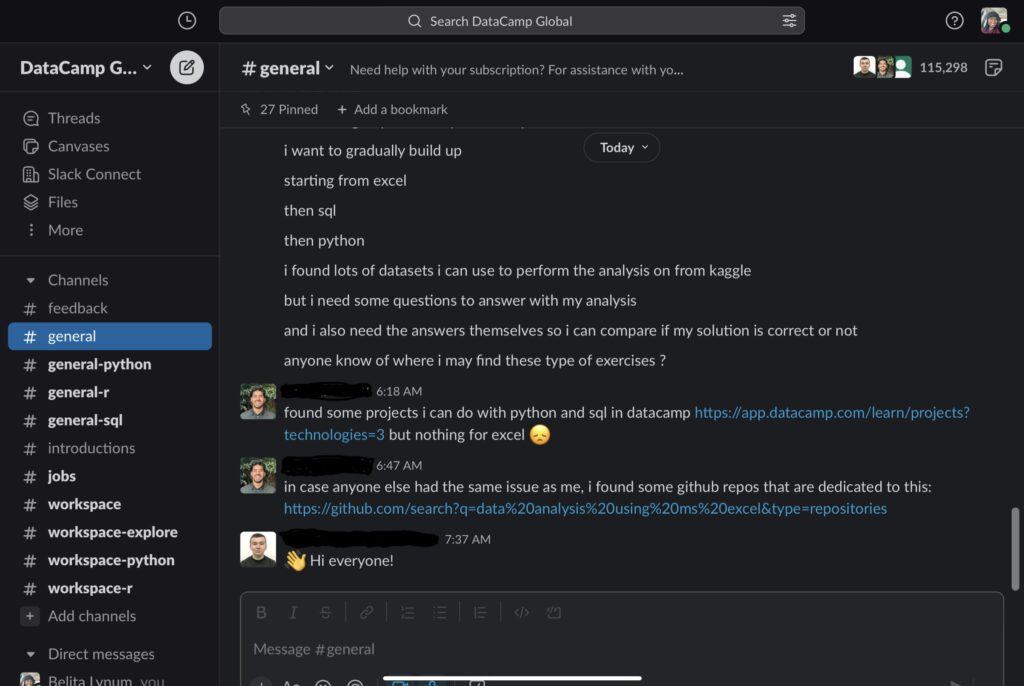
DataCamp’s Slack community is another resource for anyone looking to supercharge their data learning journey. Whether you’re diving into data for the first time or fine-tuning your skills, this community offers a welcoming and supportive environment. You can tap into the collective wisdom of fellow learners and even DataCamp’s own data experts, making it a dynamic hub for troubleshooting, brainstorming, and expanding your data skills.
This diversity in course offerings and features makes DataCamp a valuable resource for anyone interested in the field of data science and coding.
My Experience

I came across DataCamp Courses because I was looking for a good way to learn SQL. My current job requires SQL knowledge and I wanted to get a head start.
I liked that many of the DataCamp courses are available via the mobile app. This made it easy for me to practice and stay consistent while on the go as a busy Mom.
The videos, along with the downloadable PowerPoint slides and hands-on practice allowed the concepts to stick.
I was able to get comfortable with the language and methods, which made starting my position less stressful.
Unfortunately, my company uses MySQL and that was not available for mobile, only TSQL.
Also as a newbie, it would’ve been great to get a little more familiarity with SQL Server Management Studio (SMMS) while studying with DataCamp.
I was caught a little off guard having to use SMMS and all of its quirks for work, instead of the DataCamp interface.
Conclusion
In conclusion, DataCamp courses are a fantastic resource for women who want to embark on a coding journey. They offer the flexibility and support needed to succeed. While the cost can be a barrier, the investment in your skills and future is well worth it. So, ladies, don’t hesitate – take the plunge into the world of tech with DataCamp! ???
Click the picture to get started:
